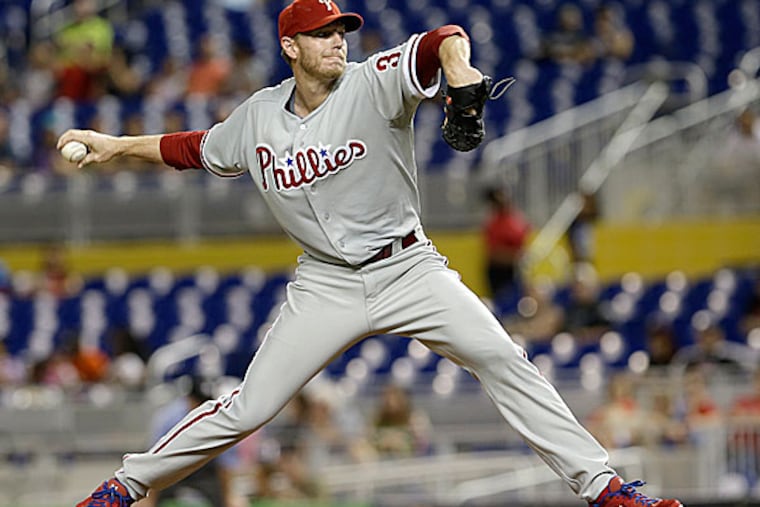Phillies shouldn't re-sign Roy Halladay
Roy Halladay will get another job in the major leagues. A pitcher with more than 200 career wins and a Cy Young Award on his resumé gets plenty of chances to prove he is no longer that same guy.

Roy Halladay will get another job in the major leagues. A pitcher with more than 200 career wins and a Cy Young Award on his resumé gets plenty of chances to prove he is no longer that same guy.
Someone will sign Halladay as a free agent this offseason, because a talent like his is hard to find and, for many baseball franchises, money isn't. Even though Halladay stood on the mound in Miami on Monday night, flushed and tired after throwing 16 pitches, sweating like a condemned man, he will work again.
It shouldn't be for the Phillies, though.
Let another team, and maybe another one after that, learn the awful truth that Halladay is finished as a reliable pitcher. This team has already thrown too much money at yesterday and not enough at tomorrow.
The Roy Halladay of 2010 and 2011 has disappeared into a tangle of shoulder and fatigue issues. He also has been suffering, apparently, from a stomach condition that runs in his family and is related to diet. Unless he comes from a family of glass-eaters, that shouldn't be an unsolvable part of the equation, but it all adds up to an aging veteran who is worn and weary from 19 years of professional baseball.
This season, it was difficult to watch as Halladay struggled early, underwent surgery, then returned in late August to struggle further. In the five comeback starts he had before Monday, Halladay couldn't throw the ball at his normal velocity and he couldn't throw it where he wanted. It wasn't that he turned into a nibbler because his stuff wasn't very good. He simply couldn't throw enough strikes.
Halladay lasted an average of a little more than five innings in those five starts, but also needed an average of 95 pitches to go that far. This is a guy who threw 67 complete games in his career because he could put the ball over the plate and dare batters to hit it. Based on his statistics after he came back from the surgery, it would have taken 156 pitches for him to get through nine innings.
Nothing, however, was as difficult to watch as Monday's meltdown. Halladay didn't throw a pitch faster than 83 m.p.h. and left the game after facing just three batters. Even if pitching that way couldn't hurt his arm, as Halladay claimed, Rich Dubee and Ryne Sandberg got him out of there before a line drive killed him.
"It was a lot of effort to throw," Halladay said. "I truly believe I could have kept pitching . . . but I don't think it was going to come out of my hand better and the location wasn't going to be any better."
Halladay called his surgeon after he was removed from the game and was told the crushing fatigue he felt was perfectly normal. According to Halladay, he needed to get three weeks of total rest after the surgery to prevent the eventual fatigue, but took only a few days before going through the rehabilitation process. He said that meant what happened on Monday was inevitable, but also that going through it will make his comeback for 2014 much easier. There may be people who can follow and understand this gobbledygook, but none of them are sitting at this particular keyboard.
In any case, Halladay, who is finishing out a three-year, $60 million contract and will turn 37 next May, wants to keep pitching.
"I don't know what the future is going to hold, but I want to go somewhere that wants me and that is going to have a shot," he said. "I hope that's here."
I hope not. The Phillies have chased these rabbits into the earth before and they are having trouble getting back above ground as a result.
It is possible, even likely, that Halladay isn't going to command a huge salary or a long contract on the open market. He might even have to settle for an incentive-heavy contract that requires a certain number of starts or innings before a big payout.
Fine. Let someone else give it to him. If the Phillies were to sign him, even to a financially reasonable deal, they will still make space for him in the rotation and move forward as if he is part of the plan. That didn't work well this season. A rotation that started out with Cole Hamels, Cliff Lee, Halladay, John Lannan, and Kyle Kendrick on opening day was quickly reduced by two pitchers, opening the way for stopgap solutions like Jonathan Pettibone, Tyler Cloyd, and Ethan Martin. Injuries can't be predicted, of course, except perhaps in the case of Halladay. A plan that includes him isn't a good plan.
"If things go the way that I've been told they're going to go and the way I expect them to go, I'm going to be competitive next year," Halladay said. "I've never given up hope."
He's not supposed to give up hope. The Phillies, however? They have to.